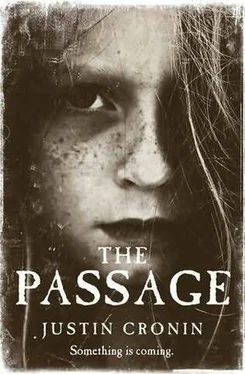The warden was a black man, about fifty, with salt-and-pepper hair and the chest of a weight lifter compressed under his suit vest. He neither rose nor offered to shake their hands as they entered. Wolgast gave him the documents to look over.
He finished reading and looked up. “Agent, this is the goddamnedest thing I’ve ever seen. What in the hell would you want Anthony Carter for?”
“I’m afraid I can’t tell you that. We’re just here to make the transfer.”
The warden put the papers aside and folded his hands on his desk. “I see. And what if I said no?”
“Then I would give you a number to call, and the person on the other end of the line would do his best to explain that this is a matter of national security.”
“A number.”
“That’s correct.”
The warden sighed irritably, spun in his chair, and gestured out the wide windows behind him. “Gentlemen, do you know what that is out there?”
“I’m not following you.”
He turned to face them again. He didn’t seem angry, Wolgast thought. Just a man accustomed to having his way. “It’s Texas. Two hundred sixty seven thousand square miles of Texas, to be precise. And the last time I checked, Agent, that’s who I work for. Not for anybody in Washington, or Langley, or whoever the hell is on the other end of that number. Anthony Carter is an inmate in my care, and I’m charged by the citizens of this state to carry out his sentence. Short of a phone call from the governor, I’m going to do exactly that.”
Goddamn Texas, Wolgast thought. This was going to take all day. “That can be arranged, Warden.”
He held up the papers for Wolgast to take. “Well then, Agent. You better arrange it.”
At the visitors’ entrance they collected their weapons and returned to the car. Wolgast got on the phone to Denver, which patched him through to Colonel Sykes on an encrypted line. Wolgast told him what had happened; Sykes was irritated but said he’d make the arrangements. A day at the most, he said. Just hang around and wait for the call, then get Anthony Carter to sign the papers.
“Just so you know, there may be a change in protocol coming your way,” Sykes told him.
“What sort of change?”
Sykes hesitated. “I’ll let you know. Just get Carter to sign.”
They drove to Huntsville and checked into a motel. The warden’s stonewalling was nothing new-it had happened before. The delay was aggravating, but that was all it was. A few days from now, a week at most, Carter would be in the system, and all evidence that he’d ever existed would be wiped from the face of the earth. Even the warden would swear he’d never heard of the guy. Somebody would have to talk to the deceased’s husband, of course, the River Oaks lawyer with the two little girls he now had to raise himself, but that wasn’t Wolgast’s job. There would be a death certificate involved, and probably a story about a heart attack and a quick cremation, and how justice had, in the end, been served. It didn’t matter; the job would get done.
By five they hadn’t heard anything, so they changed out of their suits into jeans and walked up the street to find a place for dinner, choosing a steak joint on a commercial strip between a Costco and a Best Buy. It was part of a chain, which was good-they were supposed to travel lightly, to leave as little an impression on the world around them as possible. The delay had made Wolgast antsy, but Doyle seemed not to mind. A good meal and a little time off in a strange town, courtesy of the federal government-why complain? Doyle sawed his way through a huge porterhouse, thick as a two-by-four, while Wolgast picked at a plate of ribs, and when they’d paid the check-in cash, pulled off a wad of fresh bills Wolgast kept in his pocket-they took a pair of stools at the bar.
“Think he’ll sign?” Doyle asked.
Wolgast rattled the ice in his Scotch. “They always do.”
“I suppose it’s not much of a choice.” Doyle frowned into his glass. “The needle, or whatever’s behind curtain number two. But even so.”
Wolgast knew what Doyle was thinking: whatever was behind the curtain, it was nothing good. Why else would they need death row inmates, men with nothing to lose?
“Even so,” he agreed.
A basketball game was playing on the television above the bar, the Rockets and Golden State, and for a while they watched in silence. It was early in the game, and both teams seemed sluggish, moving the ball around without doing much of anything with it.
“You hear anything from Lila?” Doyle said.
“Actually, yeah.” Wolgast paused. “She’s getting married.”
Doyle’s eyes widened. “That guy? The doctor?”
Wolgast nodded.
“That was fast. Why didn’t you say something? Jesus, what’d she do, invite you to the wedding?”
“Not exactly. She sent me an email, thought I should know about it.”
“What did you say?”
Wolgast shrugged. “I didn’t.”
“You didn’t say anything?”
There was more to it, but Wolgast didn’t want to go into it. Dear Brad , Lila had written, I thought you should know that David and I are expecting a child. We’re getting married next week. I hope you can be happy for us . He’d sat at the computer staring at the message on the screen for a good ten minutes.
“There was nothing to say. We’re divorced, she can do what she wants.” He drained his Scotch and peeled off more bills to pay. “You coming?”
Doyle passed his eyes over the room. When they’d first sat at the bar, the place was nearly empty, but more people had come in, including a group of young women who had pushed together three tall tables and were drinking pitchers of margaritas and talking loudly. There was a college nearby, Sam Houston State, and Wolgast supposed they were students, or else they worked together somewhere. The world could be going straight to hell in a handbasket, but happy hour was happy hour, and pretty girls would still fill the bars in Huntsville, Texas. They were wearing clingy shirts and low-cut jeans with fashionable tears at the knees, their faces and hair done for a night on the town, and they were drinking furiously. One of the girls, a little heavy, sitting with her back to them, wore her pants so low on her spine that Wolgast could see the little hearts on her underwear. He didn’t know if he wanted to get a closer look or throw a blanket over her.
“Maybe I’ll stay awhile,” Doyle said, and raised his glass in a little toast. “Watch the game.”
Wolgast nodded. Doyle wasn’t married, didn’t even have a steady girlfriend. They were supposed to keep their interactions to a minimum, but he didn’t see how it was any of his business how Doyle spent his evening. He felt a flicker of envy, then put the thought aside.
“Okay. Just remember-”
“Right,” Doyle said. “Like Smokey Bear says, take only pictures, leave only footprints. As of this moment, I’m a fiber-optic sales rep from Indianapolis.”
Behind them, the girls broke into laughter; Wolgast could hear the tequila in their voices.
“Nice town, Indianapolis,” Wolgast said. “Better than this one, anyway.”
“Oh, I wouldn’t say that,” Doyle replied, and grinned mischieviously. “I think I’m going to like it here just fine.”
Wolgast left the restaurant and walked up the highway. He’d left his handheld behind at the motel, thinking they might get a call during dinner and have to leave; but when he checked it now, he found no messages. After the noise and activity of the restaurant, the quiet of the room was unsettling, and he began to wish he’d maybe stayed with Doyle, though he knew he wasn’t very good company these days. He removed his shoes and lay on his bed in his clothes to watch the rest of the game, not really caring one way or the other about it, but it gave his mind something to focus on. Finally, a little past midnight-eleven in Denver, a little too late, but what the hell-he did what he’d told himself he wouldn’t do and dialed Lila’s number. A man’s voice answered.
Читать дальше












